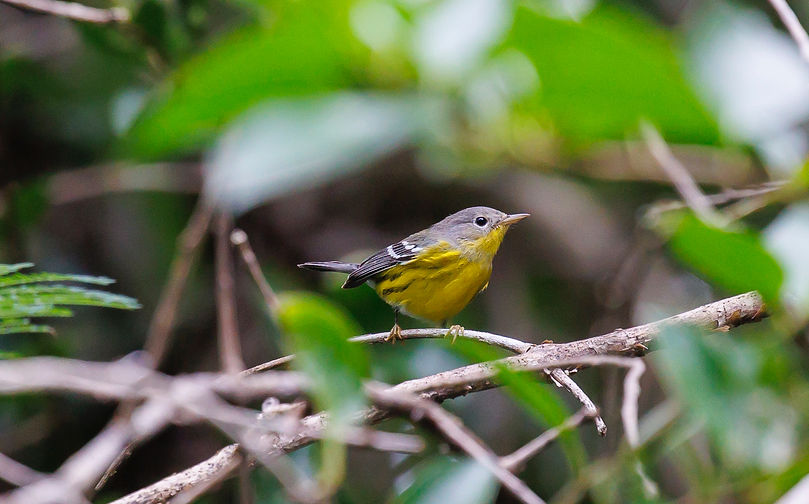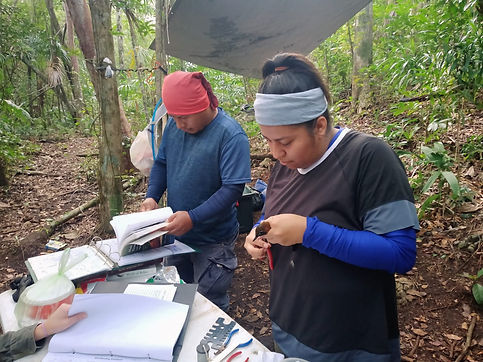
Bird Monitoring Overwinter Survival (MOSI) Program
Standardized bird monitoring for healthier ecosystems and informed biodiversity management.
Photo: (c) Sean Werle – (CC BY-NC) iNaturalist
Project Summary
Belize is a vital stopover and wintering ground along the migratory flyway for Neotropical birds, with over 607 bird species recorded to date via the online platform eBird. Of these, approximately 23% are migratory, including many species of warblers, vireos, flycatchers, thrushes, and shorebirds. These migratory birds are often sensitive to habitat disturbance, making them important indicators of overall ecosystem health. Despite this potential, Belize has had limited bird monitoring efforts that are consistent, long-term, and standardized, critical elements for understanding ecological change and informing adaptive natural resource management.
In response, the University of Belize Environmental Research Institute (UB-ERI), in collaboration with national and international partners, launched the "Improving Natural Resources Management in Belize through Bird Monitoring"project in 2016. This initiative adopts the Monitoring of Overwintering Survival of Neotropical Migrants (MoSI)protocol, developed by the Institute for Bird Populations, which standardizes the collection of bird data across sites and over time.
At the heart of the program is bird banding, a research technique where a lightweight, uniquely numbered aluminum band is gently placed around a bird’s tarsus. This allows scientists to gather vital information on migration patterns, lifespan, and habitat use, contributing to long-term population monitoring and conservation.
Birds are captured using fine mist nets (36 mm mesh, 3 meters high) strategically placed in areas with edge habitat and close to the banding station. Nets are checked every 30 minutes, and birds are carefully extracted and brought to a banding table, where trained banders record key data such as species, age, sex, weight, fat stores, wing chord length, and molt status. All work is carried out by experienced personnel under proper research permits issued by the Belize Forest Department and the U.S. Geological Survey Bird Banding Lab.
The non-breeding season monitoring period runs annually from November to December, contributing valuable data on overwintering bird populations across Belize.

Photo @Zygy iNaturalist
Approximately 23% of the 607 bird species recorded in Belize are migratory—many of which serve as sensitive indicators of ecosystem health
Project Outputs
The main outputs of the project are as follows:
-
Establishment of a Long-Term Bird Monitoring Database – Develop a standardized dataset with a minimum of five years of monitoring data per site, including sufficient recaptures to support occupancy modeling and other analyses of bird population trends.
-
Support for National Biodiversity Monitoring – Provide data and methodological guidance to inform the integration of bird monitoring within Belize’s National Biodiversity Monitoring Program (NBMP).
-
Community Engagement in Bird Conservation – Foster citizen science participation by engaging birders, tour guides, and the wider tourism sector in bird monitoring and habitat conservation efforts across Belize.
Methodological Approach
The project follows the standardized MoSI (Monitoreo de Sobrevivencia Invernal) protocol to monitor both migratory and resident bird species during the non-breeding season. Bird banding is conducted using methods outlined in the MoSI Manual developed by DeSante, ensuring consistency across all participating stations. Target species are chosen based on their high capture rates in ground-level mist nets, conservation significance, and their potential to reflect broader population trends across the Americas.
Mist-netting is carried out in accessible areas with high bird activity and suitable habitat. According to MoSI protocol, nets are operated for six hours per day over a three-day period between November and March. In cases of poor weather, extreme heat, or predator presence, field teams adjust operations to meet the minimum required effort of 12 hours. The data collected contributes to long-term monitoring of bird productivity and survival, providing valuable insights into regional population dynamics.

Bird banding provides vital information on migration, lifespan, and habitat use, contributing to long-term population monitoring and conservation
UB-ERI Project Team
Partner Project Teams
Present Lead Banders:
-
Abidas Ash (2016-present) - UB-ERI
-
Reymundo Chen (2020-present) - TIDE
-
Liberato Pop (2020-Present) - FWC
Present Assistant Banders:
-
Salustino Peck (2020-present) - BAS
-
Kevin Tsao (2023-present) - BAS
-
Victor Novelo (2023-present) - BAS
-
Miguel Sho (2024-present) - BAS
-
Isani Cal (2024- present) - BAS
-
Pedro Bol (2024 - present) - BAS
-
Reynold Cal (2018-present) - FWC
-
Kayla Hartwell (2018-present) - FWC
-
Agustin Pop (2020-present) - TIDE
-
Owen Williams (2020-present) - TIDE
-
Mario Muschamp (2021-present) - TIDE
-
George Teul (2023-present) - TIDE
-
Nigel Salam (2024 - present) - TIDE
-
Lenard Teul (2021 - present) - TIDE
-
Octavio Cal (2022- present) - TIDE
-
Elsy Perez (2024-present) - UB ERI
Past Lead Banders:
-
Lauren DiBacarri (2016-2017) - affiliated with Manomet Bird Observatory
-
Blaine Carnes (2017-2019) - affiliated with the IBP
Past Volunteers:
-
Mary Alice Koeneke (2017-2019) - Volunteer from Pennsylvania
-
Mark LaBarr (2018-2019) - Audubon Vermont
-
Daniel Arndt (2018-2019) - Birder/Environmentalist
Past Assistant Banders:
-
Eluterio Pop (2016-2019) - BAS
-
Emmanuel Saqui (2018-present (2022)) - BAS
-
Diego Cruz (2016-2019) - BRL
-
Isaias Morataya (2016-2021) - BRL
-
Fernando Obando (2019-2021) - BRL
-
Stevan Reneau (2018-2022) - FWC
-
Gilroy Welch (2019- 2023) - FWC
-
Luis Pena (2017-2019) - CSFI
-
Eduany Munoz (2017-2019) - CSFI
-
Gliselle Marin (2019-2021) - UB-ERI
-
Mario Xi (2020-2021)) - TIDE
-
Andrew Williams (2021- 2023) - TIDE
-
Anel Marin (2021- 2022) - CSFI
-
Gmayel Ayuso (2021-2022) - CSFI
-
Jose Viamil (2021-2022) - CSFI
-
Jorge Peña (2021-2022) - CSFI
-
Leonardo Gonsalez (2021-2022) - CSFI









